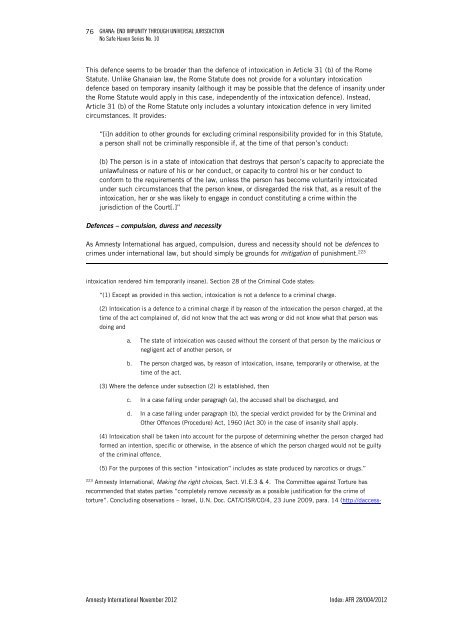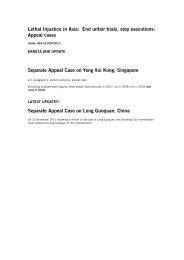Ghana - Amnesty International
Ghana - Amnesty International
Ghana - Amnesty International
Create successful ePaper yourself
Turn your PDF publications into a flip-book with our unique Google optimized e-Paper software.
76GHANA: END IMPUNITY THROUGH UNIVERSAL JURISDICTIONNo Safe Haven Series No. 10This defence seems to be broader than the defence of intoxication in Article 31 (b) of the RomeStatute. Unlike <strong>Ghana</strong>ian law, the Rome Statute does not provide for a voluntary intoxicationdefence based on temporary insanity (although it may be possible that the defence of insanity underthe Rome Statute would apply in this case, independently of the intoxication defence). Instead,Article 31 (b) of the Rome Statute only includes a voluntary intoxication defence in very limitedcircumstances. It provides:“[i]n addition to other grounds for excluding criminal responsibility provided for in this Statute,a person shall not be criminally responsible if, at the time of that person’s conduct:(b) The person is in a state of intoxication that destroys that person’s capacity to appreciate theunlawfulness or nature of his or her conduct, or capacity to control his or her conduct toconform to the requirements of the law, unless the person has become voluntarily intoxicatedunder such circumstances that the person knew, or disregarded the risk that, as a result of theintoxication, her or she was likely to engage in conduct constituting a crime within thejurisdiction of the Court[.]”Defences – compulsion, duress and necessityAs <strong>Amnesty</strong> <strong>International</strong> has argued, compulsion, duress and necessity should not be defences tocrimes under international law, but should simply be grounds for mitigation of punishment. 223intoxication rendered him temporarily insane). Section 28 of the Criminal Code states:“(1) Except as provided in this section, intoxication is not a defence to a criminal charge.(2) Intoxication is a defence to a criminal charge if by reason of the intoxication the person charged, at thetime of the act complained of, did not know that the act was wrong or did not know what that person wasdoing anda. The state of intoxication was caused without the consent of that person by the malicious ornegligent act of another person, orb. The person charged was, by reason of intoxication, insane, temporarily or otherwise, at thetime of the act.(3) Where the defence under subsection (2) is established, thenc. In a case falling under paragragh (a), the accused shall be discharged, andd. In a case falling under paragraph (b), the special verdict provided for by the Criminal andOther Offences (Procedure) Act, 1960 (Act 30) in the case of insanity shall apply.(4) Intoxication shall be taken into account for the purpose of determining whether the person charged hadformed an intention, specific or otherwise, in the absence of which the person charged would not be guiltyof the criminal offence.(5) For the purposes of this section “intoxication” includes as state produced by narcotics or drugs.”223<strong>Amnesty</strong> <strong>International</strong>, Making the right choices, Sect. VI.E.3 & 4. The Committee against Torture hasrecommended that states parties “completely remove necessity as a possible justification for the crime oftorture”. Concluding observations – Israel, U.N. Doc. CAT/C/ISR/CO/4, 23 June 2009, para. 14 (http://daccess-<strong>Amnesty</strong> <strong>International</strong> November 2012 Index: AFR 28/004/2012
















